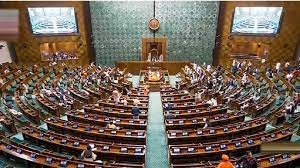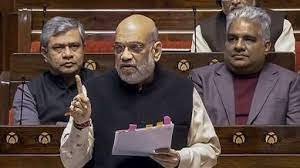
In a somber denouement, the Winter Session of the Indian Parliament gracefully reached its conclusion, adjourning sine die. This legislative sojourn, marked by profound deliberations and a myriad of legislative endeavors, witnessed the passage of pivotal bills poised to reshape the nation’s governance panorama. Examining the aftermath of this session, it becomes apparent that the Parliament adeptly traversed intricate landscapes, tackling critical issues through a series of impactful legislation.
Parliament’s Winter Session 2023: Overview
The Winter Session, a pivotal juncture in the parliamentary calendar, commenced against the backdrop of pressing national concerns. The political terrain pulsated with discussions spanning citizenship nuances to the very structures underpinning governance. Unfolding as a crucible for intense debates and impassioned exchanges, it metamorphosed into the forge where legislation was crafted, leaving an indelible mark on the nation.
The Legislative Odyssey: Key Bills Enacted
Citizenship (Amendment) Bill, 2023
In the intricate tapestry of legislative affairs, the recently concluded Winter Session unfurled a panorama of bills, each vying for attention and scrutiny. Topping the list was the Citizenship (Amendment) Bill, 2023, a legislative behemoth introduced in the august chambers of the Rajya Sabha on August 10, 2023. This legislative magnum opus seeks to orchestrate a seismic shift in the contours of citizenship laws, sparking impassioned debates among parliamentarians.
The proposed amendments, akin to a philosophical treatise on civic belonging, aspire to recalibrate the very essence of citizenship acquisition. Advocates contend that these changes are a sine qua non for streamlining the convoluted citizenship acquisition process, while critics raise poignant concerns about the potential ramifications on inclusivity and social cohesion.
Post Office Bill: Revolutionizing Epistolary Services
The Winter Session witnessed the introduction and subsequent passage of the Post Office Bill, a legislative milestone aimed at revolutionizing epistolary services in the country. This bill, dissected exhaustively in both Houses, underscores the government’s unwavering commitment to modernizing pivotal public services.
Seamlessly transitioning from deliberations on citizenship and governance structures, the Parliament directed its focus to the intricacies of essential services. The Post Office Bill, with its far-reaching implications, endeavors to align postal services with the demands of the digital age.
Telecom Bill: Navigating the Digital Expanse
In tandem with the Post Office Bill, the Parliament delved into the intricacies of the Telecom Bill, acknowledging the ever-evolving nature of technology and communication. Against the backdrop of rapid technological strides, the bill seeks to recalibrate telecom regulations to ensure their pertinence and resilience.
The shift from discussions on postal services to telecommunications reflects the Parliament’s proactive stance in adapting to the changing needs of a digital society. The Telecom Bill is poised to delineate the rules of engagement in an era where communication transcends boundaries.
Two Taxation Bills: Navigating Fiscal Topography
Parallel to these legislative juggernauts, the Winter Session bore witness to the enactment of two consequential taxation bills, intricately designed to reshape the fiscal landscape. These fiscal overtures, akin to economic sonnets, ignited debates on fiscal responsibility, economic growth, and equitable resource distribution.
Effortlessly transitioning from discussions on technology and communication, the Parliament engaged in a meticulous scrutiny of taxation policies. The Two Taxation Bills, with their nuanced provisions, signify a holistic approach to fiscal governance.
3 New Criminal Bills: Safeguarding Security and Justice

The Winter Session bore witness to the Parliament’s unwavering commitment to national security with the passage of three new Criminal Bills. Addressing offenses related to terrorism and acts against the State, these bills represent a robust response to evolving threats.
The transition from fiscal matters to national security underscores the multi-faceted nature of governance. The 3 New Criminal Bills reflect the Parliament’s determination to ensure the safety and well-being of its citizens.
Chief Election Commission’s Appointment Bill: Enhancing Electoral Governance
The Chief Election Commission’s Appointment Bill, a narrative of institutional recalibration, took center stage in a notable legislative development. This legislation, an embodiment of democratic fortitude, aims to redefine the process of appointing the Chief Election Commissioner (CEC), emphasizing transparency, impartiality, and the preservation of the Election Commission’s autonomy.
As the nation grapples with the imperative of conducting free and fair elections, the Chief Election Commission’s Appointment Bill stands as a testament to the conscientious efforts to fortify the foundations of democratic governance.
Term of Office (Amendment) Bill, 2023: Navigating the Waters of Governance Stability
Walking in lockstep with the Citizenship (Amendment) Bill was the Term of Office (Amendment) Bill, 2023, a legislative consort equally influential in the intricate dance of governance reform. This bill, after meticulous scrutiny and parliamentary nod, introduces nuanced amendments to the temporal dimensions of certain pivotal positions. The debates surrounding this bill metamorphosed into a symphony of perspectives, exploring the delicate equilibrium between stability and effective governance.
Within the parliamentary precincts, legislators engaged in meticulous debates, weighing the pros and cons of the proposed changes. The amendments, while ostensibly subtle, bear the weight of reshaping the temporal dimensions of certain offices, thereby influencing the stability and continuity of governance.
As the Parliament deliberated on the Term of Office (Amendment) Bill, 2023, it underscored the institution’s commitment to a periodic review of governance structures. The intricate dance between stability and adaptability unfolded in the legislative arena, laying bare the Parliament’s dedication to the nuances of effective governance.
Challenges and Triumphs: Record Suspensions and Legislative Highlights
The Winter Session of 2023, notwithstanding disruptions and a record number of suspensions totaling 146, emerged as a testament to the Parliament’s legislative productivity. In a meticulous dance between efficiency and adaptability, the session recorded the passage of 18 bills in the Lok Sabha, boasting a commendable productivity rate of 74%.
The efficient conclusion of the session, adjourning sine die a day ahead of the scheduled closure, signifies a delicate equilibrium between legislative efficiency and the ability to navigate unforeseen circumstances. The Parliament, as an institution, showcased resilience and adaptability, ensuring that legislative priorities were addressed despite the challenges encountered during the session.
A Legislative Tapestry Unveiled

As we draw the curtains on the Winter Session of 2023, a nuanced legislative tapestry unfolds. From discussions on citizenship and governance structures to the intricate details of taxation policies and national security, the Parliament navigated diverse terrains with diligence and commitment.
The Winter Session of 2023 will be remembered not just for the bills enacted but for the robust discussions, debates, and the overall spirit of democratic governance that permeated the hallowed halls of Parliament. As the nation absorbs the impact of these legislations, the Winter Session stands as a testament to the Parliament’s role as the cornerstone of India’s democratic ethos.










